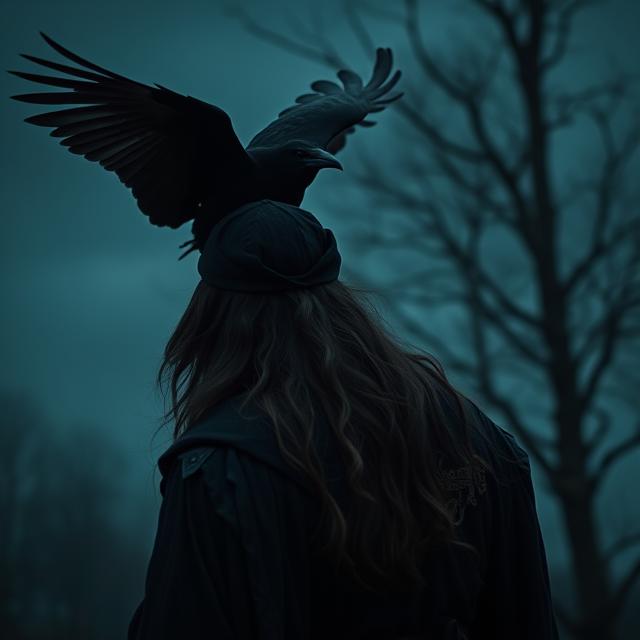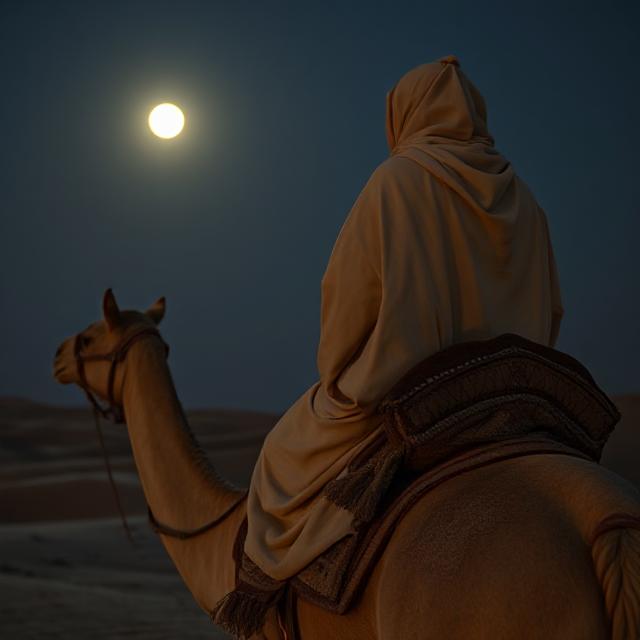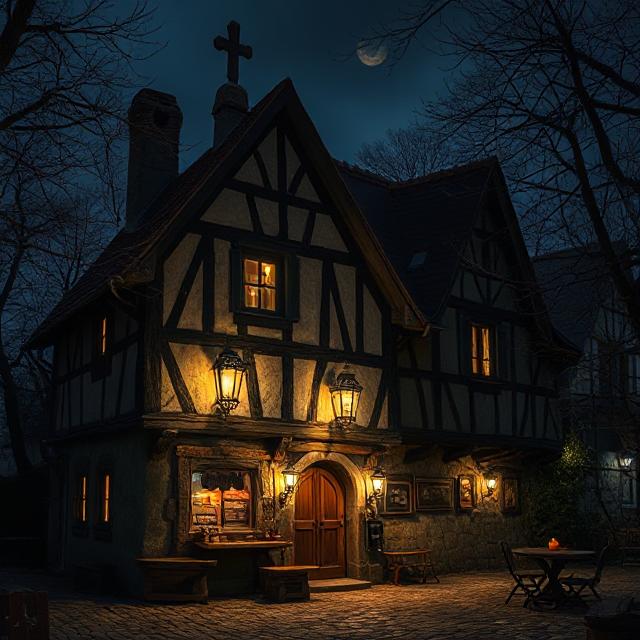The desert tightens around you.
You ride single file, the guide in front, Robert behind. No one speaks. The dunes ripple in silent waves, their curves hiding shadows that move—or seem to. The air has changed. It presses in on you, heavy with memory and something unspoken. Even the wind feels different, dragging hot and sharp across your skin.
You pass another sign: a half-buried standard, the fabric faded, its sigil half-erased by sun and time. The guide doesn’t stop. Neither do you. Robert mutters something behind you—“Too clean.” You don’t ask what he means.
By late afternoon, the sky turns strange. Pale yellow deepens to copper. The sun dulls behind a wall of rising grit.
—Storm,— the guide says simply.
You follow his gaze. A massive sandstorm unfurls along the horizon like a beast uncurling from slumber—wide, rolling, relentless.
—We need shelter,— Robert says, reining his horse up beside you.
The guide points with two fingers, swift and silent. A rocky outcrop juts from the side of a shallow basin to the north—crumbled sandstone and wind-worn shale.
You nod. —Ride fast.
The three of you spur forward, hooves tearing through soft sand. The wind is rising—fast now, loud. The guide leads, weaving between dunes like a thread through cloth. Robert hangs behind, close but wary. His horse stumbles briefly, and he swears.
A gust hits, harder than the last, and the world shudders.
You push on.
Then—noise. A crash. You wheel around just in time to see Robert’s mount rear violently and throw him.
—Robert!
He lands hard, rolling, half-buried before he even stops moving. He’s shouting something, but it’s torn away by the wind. The guide grabs your reins.
—We go! Now!
—He’s down!—
The guide’s eyes narrow. —You go back and you both die.
You hesitate—longer than you should—but the sand is blinding, stinging, shrieking. You can’t see Robert anymore. Just shapes and noise. Then the guide yanks your reins, and your horse surges forward.
You shelter behind the rocks moments before the storm hits.
Time folds. Wind roars like the sea. The world disappears into colorless violence. You crouch low with your cloak over your face, trying not to breathe the storm. The guide holds the horses steady, his head bowed, unmoving.
When it ends, the silence is louder than the storm.
You rise slowly, blinking sand from your lashes. The dunes are changed—rebuilt, erased, unfamiliar. Tracks gone. Landmarks buried.
No sign of Robert.
Only sky, and sand, and the long scream of absence inside your chest.
The desert offers no apology for its silence. Hours pass beneath the blazing eye of the sun, and each night the crow returns.
You see it more clearly now: perched on your chest, its feathers rimmed in cinders, wings beating in rhythm with your heart. When it opens its beak, flames curl from its throat, and cities fall in the reflection of its eyes. Zalenica, burning. Your uncle, falling. You awaken with your hands clenched around your throat as if trying to rip out whatever curse clings there.


Still, you ride.
The guide says little, as if the desert demands reverence, or perhaps he senses you are not in the mood for talk. Sand gives way to stone, and by dusk of the second day, the desert unfurls into the outer sprawl of Al-Mazir—a city carved in sandstone and grit, held together by old trade and older grudges.
–We can rest here for the night,– your guide says, nudging his mount toward a stony slope. –We’ll press on at dawn. There’s a good inn near the western gate. Decent food. Cheap beds. Try not to get robbed. Or worse.–
You nod, lips too dry to reply. The city swallows you.

The tavern smells of dates, sweat, and something charred beyond recognition. But it has shade, and you’re too tired to care. You eat slowly—flatbread and stewed meat—when something in the corner of your eye draws you up like a blade pulled from its sheath.
Hiacynt.
He’s slouched in a dark corner, a shadow of the man you once knew—cheeks sunken, clothes torn, one eye ringed in purple. But it’s him.
You drop your plate. The sound cracks the room.
You’re across the floor in moments. You grab him by the collar and yank him up with a force born of rage and disbelief.
–Why did you betray me? Why did you leave me to die in the desert?!–
His mouth opens, but no words come. He blinks like someone waking into a nightmare.
–Answer me!!– you roar.
–I thought you were dead…– he manages, his voice hoarse. –We looked. We searched for days. I swear it. I thought you were—–
You hit him. Hard. The crack of knuckles against jaw echoes through the tavern. He stumbles back, crashing into the table behind him.
The manager—a thick-armed man with a beard like wire—storms over.
–None of that in here! Out! Both of you!–
He grabs your arm, but your guide is there in an instant, intercepting him.
–Keep your hands off,– the guide growls, eyes narrow. –My companion is not some drunken thug. Let him leave with dignity.–
The manager hesitates, then shoves you toward the exit. –Then get him out before I do.–
You stumble outside into the night air, heart hammering. The streets of Al-Mazir are quieter than you expected—too quiet, like the city’s holding its breath. The wind smells of dust and old sorrow.
You wait.
You’re not sure for how long. Minutes. Maybe more. People come and go. Laughter spills from open windows. But not Hiacynt.
He doesn’t follow.
You stare at the door, willing it to open, but it stays shut. Behind your ribs, something splinters—not rage this time, but disappointment. Maybe even grief. You wanted answers, and all you got was a man broken worse than you remembered.
Your guide stands beside you in silence, arms crossed.
–He won’t come,– he says at last. –Whatever drove him to leave you wasn’t courage, but fear. And fear leaves rot behind it.–
You say nothing. The door doesn’t open.
The inn is just down the road—warm light in the windows, the sound of a lute filtering through the wooden shutters. Your bed waits. So does the road.
You take a breath.
Now you must choose:

2 Comments